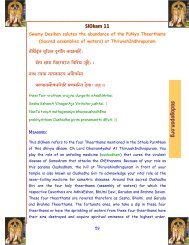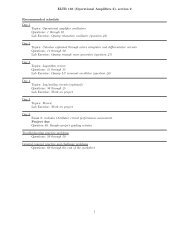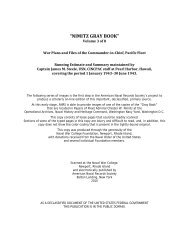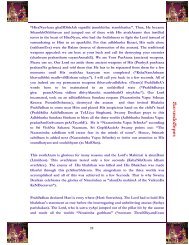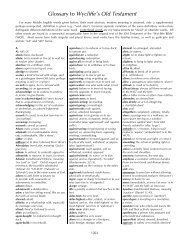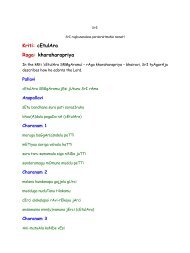ITALIAN BOOKSHELF (download as PDF) - Ibiblio
ITALIAN BOOKSHELF (download as PDF) - Ibiblio
ITALIAN BOOKSHELF (download as PDF) - Ibiblio
Create successful ePaper yourself
Turn your PDF publications into a flip-book with our unique Google optimized e-Paper software.
446 Annali d’italianistica 30 (2012)<br />
The translation uses British spelling in some instances and American in others<br />
(including the use of variants “favor” and “favour” in consecutive lines, 73).<br />
Even the author himself falls victim to his editors’ lack of proofreading zeal; his<br />
name is spelled with a grave accent over the e in most instances (including on<br />
the cover), but it frequently appears with an acute accent <strong>as</strong> well (113, 171).<br />
Beyond its inconsistencies, the translation suffers from many other<br />
substantive issues. Technically, it is full of errors, including abundant botched<br />
punctuation. Enraged characters mellow when exclamation points disappear in<br />
translation. One character, stripped of his Mediterranean temperament by his<br />
linguistic migration, pronounces matter-of-factly, “How dare you open my<br />
m<strong>as</strong>ter’s door” (123). Questions such <strong>as</strong> “What is there to tell” (143), likewise,<br />
become awkward statements because the translators or the editor have omitted<br />
the question mark. Typos perplex the reader: “When he prince saw her he fell in<br />
love” (23); “[…] when I get back I want to see everything ready, otherwise<br />
you’re for it” (47); “It’s time h<strong>as</strong> arrived” (89). Even more troubling are<br />
instances when the translators’ choices result in strange or incomprehensible<br />
phr<strong>as</strong>es. When a little girl misbehaves in one story, her father excuses her,<br />
saying, “she is still a child and you have got to feel sorry for her” (59). The<br />
original, “ca è picciridda, e s’havi a cumpàtiri” (58), says something quite<br />
different, namely, “we need to be indulgent with her,” a disconnect resulting<br />
from the mistranslation of “cumpàtiri.” Elsewhere, the exclamation<br />
“tradimentu!” becomes “traitor!” (78-79), a poor choice since the character<br />
really means, “I’ve been betrayed!” Simple phr<strong>as</strong>es that flow smoothly in<br />
Sicilian clunk in translation. One formulaic beginning, “si cunta ca cc’era un Re<br />
e ’na Riggina” becomes, “it h<strong>as</strong> been said that once upon a time there w<strong>as</strong> a<br />
King and a Queen” (88-89), an excessively wordy solution to the (admittedly<br />
tricky) si impersonale.<br />
The most serious problem facing The King of Love and Other Tales is that<br />
its intended audience is unclear; it is impossible to say whether the translators<br />
have done their work with schoolchildren or scholars in mind. Several examples<br />
highlight this fundamental incoherency. The text is cleansed of “offensive”<br />
words and phr<strong>as</strong>es in the translation, because, <strong>as</strong> the introduction tells us,<br />
“[w]here somewhat obscene or ‘indelicate’ words are concerned the translator<br />
h<strong>as</strong> preferred to use a more acceptable term to allow the stories to be read to<br />
children” (xii). It seems odd, then, that Cocuzza and Watson have chosen rather<br />
salacious tales in which characters p<strong>as</strong>s golden feces (“The Silversmith”), face<br />
decrees prescribing incestuous marriage (“The Girl in the Horse’s Skin”), or<br />
escape an evil witch by “catch[ing] her nipples and grip[ping] them so hard that<br />
she will almost die of pain” (“The King of Love” 129). In this context, quibbling<br />
over the translation of the verb “cacare,” which becomes a euphemistic “to<br />
relieve oneself,” seems beside the point. Conversely, other choices suggest that<br />
the book is meant for an academic readership. Both original and translation are<br />
peppered with footnotes indicative of scholarly <strong>as</strong>pirations, scatological





